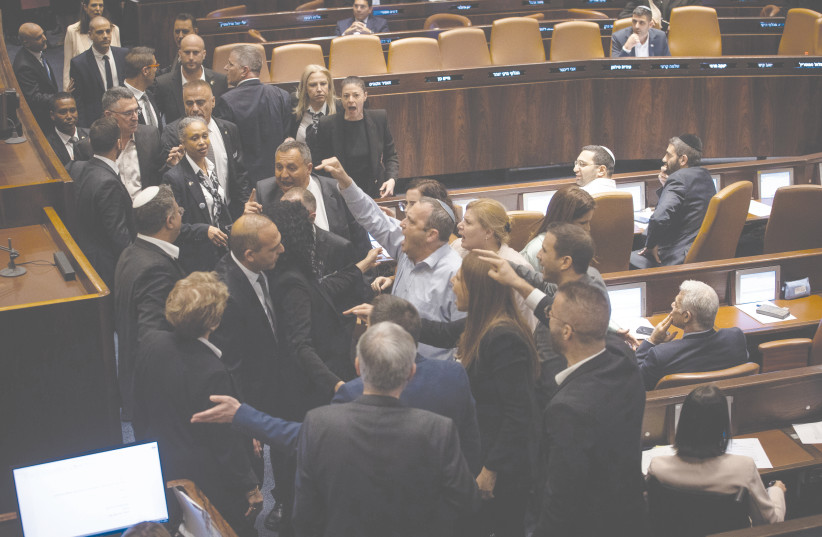The 2023-2024 budget, an updated haredi conscription law and the government's proposed overhaul of the judicial system are likely to dominate the agenda of the Knesset's summer session, which officially begins on Sunday and will continue until July 30.
Many of the Knesset's committees will focus during the coming weeks on passing the budget law. The budget includes a package of laws, chiefly among them the 2023 Budget Law and its accompanying Economic Arrangements Law, and the 2024 Budget Law and its accompanying Economic Arrangements Law. The Arrangement Laws are packages of amendments and reforms intended to implement that year's budget. These amendments and reforms are split up among the Knesset's committees, which they are being prepared for their second and third readings. The budget must pass into law by May 29, and if not, the Knesset automatically disbands and an election is called.
The first Knesset plenum session will be held on Monday and will include a speech by US House Speaker Kevin McCarthy.
Out of the package of laws comprising the government's proposed judicial overhaul, only one has reached the plenum for its second and third reading – the law that gives the coalition a majority in the committee that is responsible for electing Israel's judges, the Judicial Selection Committee. This means that the coalition can bring forward the law for its final readings in the plenum already this week if it chooses to do so.
This is highly unlikely, however, as the makeup of the Judicial Selection Committee is one of the subjects being discussed in the negotiations between the coalition and opposition currently being conducted at the President's residence.

The negotiations will continue this week, despite barbs being traded by Justice Minister Yariv Levin during his speech at Thursday's mass pro-reform rally, and Opposition Leader Yair Lapid and the opposition National Unity Party leader Benny Gantz.
In his speech on Thursday, Levin criticized the opposition, saying that "agreement means real negotiations and also a willingness to accept large parts of the reform and not to hold discussions for over a month and say ‘no’ to every proposal.”
"Agreement means real negotiations and also a willingness to accept large parts of the reform and not to hold discussions for over a month and say ‘no’ to every proposal.”
Justice Minister Yariv Levin
Lapid and Gantz criticized Levin, who also spoke disparagingly about the High Court, and also condemned reports that protestors stomped on pictures of High Court justices.
Lapid wrote on Twitter that every Israeli who was part of the "sane majority" felt "deep shame and deep sadness" over the stomping, and accused the ministers and MKs who spoke at the rally of "continuing to tear apart the nation and dismantle Israeli society."
Gantz, in a Twitter post of his own, accused Levin of "lying and unbridled statements against the High Court," adding that they raised "difficult thoughts' about the ability to reach agreements at the President's residence. Gantz added that Levin accusing the High Court of abandoning IDF soldiers was a "disgrace." He also criticized Prime Minister Benjamin Netanyahu for not condemning Levin's speech.
Negotiations are expected to continue
The negotiations are also expected to continue despite protests organizers claiming that Levin's speech served as proof that the coalition's commitment to a consensus was a façade, and after demonstrations across the country were held for the 17th straight week.
The coalition has another issue that could reach the Knesset in the coming weeks - the haredi parties' demand to pass an updated conscription bill by the time the budget passes. The current version of the bill is set to expire on July 31, a day after the end of the Knesset's summer session. But the haredi parties are currently conditioning their support for the budget on lowering the blanket age of exemption for haredi conscripts from the current 26 to between 21-23.
Reports last week indicated that out of the three haredi factions in the coalition – Shas, Degel Hatorah and Agudat Yisrael (the latter two which ran together as United Torah Judaism), only Agudat Yisrael was insisting that the conscription bill indeed pass by the time the budget passes on May 29. If this changes, the bill would only reach the Knesset in June or July.
Troy O. Fritzhand contributed to this report.
